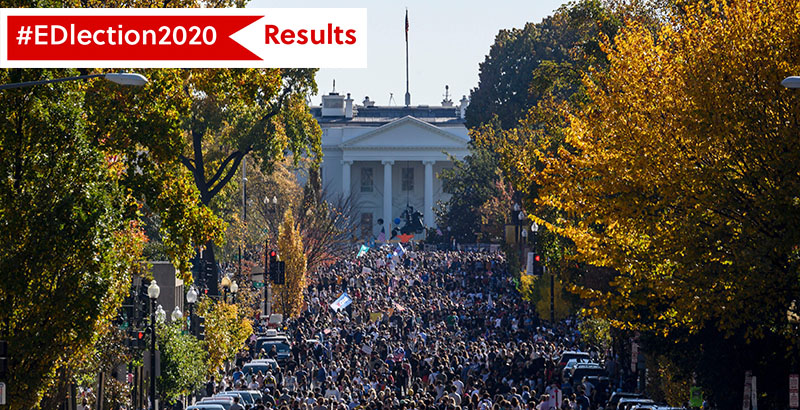Biden Wins Election, but with a Likely Divided Congress, One Ed Expert Warns, ‘There’s No Mandate Momentum Here’

2020’s KEY EDUCATION VOTES: See our full coverage of the 46 races that could reshape America’s schools following Election Day — and get the latest updates on state policies and students’ challenges during the pandemic by signing up for The 74 Newsletter.
Updated November 7
Following three suspenseful days of ballot counting, Democrat Joe Biden pushed past President Donald Trump Saturday morning to capture Pennsylvania’s 20 electoral college votes and become the nation’s 46th president.
“The work ahead of us will be hard, but I promise you this: I will be a president for all Americans — whether you voted for me or not,” Biden tweeted.
Trump, at his golf club in Sterling, Virginia, when the news was announced, promised not to go quietly. “I WON THIS ELECTION,” he tweeted, and said on Monday his legal team would be “prosecuting our case in court to ensure election laws are fully upheld and the rightful winner is seated.”
On Friday, Pennsylvania’s Republican Party asked the U.S. Supreme Court, which now includes Associate Justice Amy Coney Barrett as part of a 6-3 conservative majority, to make sure election officials were separating mail-in ballots that arrived after Election Day from those cast on Tuesday. Justice Samuel Alito responded, merely confirming those instructions.
The stakes are high for the education community, where public school leaders are clamoring for more funding to stave off likely budget cuts and many have questioned the current administration’s emphasis on private school choice.
A Biden administration would mean attention from the White House to a host of issues that matter to educators and families — early-childhood education, higher teacher pay, and affordable college, among others.
“We look forward to working closely with an administration that will embrace and fight for the values we hold dear,” including “strengthened public schools that work for all kids,” American Federation of Teachers President Randi Weingarten said in a statement.
Biden, however, will likely face a Republican-controlled Senate. That could force him to scale back the size and scope of some of his big-ticket proposals, such as tripling the size of Title I and fully funding the Individuals with Disabilities Education Act.
“All spending initiatives have to go through Congress, and he’s not likely to get the more dramatic versions of those,” said Thomas Toch, the director of FutureEd, a think tank at Georgetown University.
The control of the Senate also determines who Biden might want to nominate for education secretary. He has promised to fire Secretary Betsy DeVos and nominate an educator to take her place. But a nominee in close alignment with the teachers’ unions might be rejected.
Biden will also be working with a House where the Democratic majority has thinned and Speaker Nancy Pelosi has to work harder to build support.
“There’s no mandate momentum here,” Toch said.
2020’s KEY EDUCATION VOTES: See our full coverage of the 46 races that could reshape America’s schools following Election Day — and get the latest updates on state policies and students’ challenges during the pandemic by signing up for The 74 Newsletter.
Get stories like these delivered straight to your inbox. Sign up for The 74 Newsletter

;)
